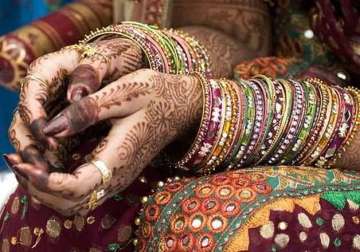Refusal to criminalise marital rape: Activists, experts differ
New Delhi: Government's refusal to criminalise marital rape has been termed as “regressive” by several women rights activists but experts supporting the Centre's stand feel there is no need to tinker with the law as

New Delhi: Government's refusal to criminalise marital rape has been termed as “regressive” by several women rights activists but experts supporting the Centre's stand feel there is no need to tinker with the law as it might be “misused” by some to settle scores. The issue, which did not garner favour from the Supreme Court, has triggered a fresh debate in the wake of Minister of State for Home Haribhai Parathibhai Chaudhary's statement in Parliament that the concept of marital rape cannot be applied in India where marriage is considered as a “sacrament”.
“Parliament is being regressive about it. Even Justice J S Verma Committee had recommended criminalising marital rape. India is ready but Parliament is not,” senior advocate Rebecca John said. Her view was shared by activists Ranjana Kumari and Vrinda Grover who vouched for a law protecting married women from forced sex with their spouse.
They said lawmakers do not want to give women their right against exploitation, even at the hands of their husbands. However, this view did not find favour with some jurists who said criminalisation of marital rape will be “dangerous” in today's scenario where instances of false implications of husband and in-laws by women are in abundance. Two retired judges—S N Dhingra and R S Sodhi—of the Delhi High Court said it will trigger misuse of law by women to settle scores.
Differing with them and supporting the women activists, senior advocate Colin Gonsalves, who took up the issue in the apex court, alleged the government was headed by “men with anti-women thinking”.
“Our government is conservative, anti-social and backward looking. It is headed by men with anti-women thinking,” he alleged, and asked “when there is law to protect women against domestic violence, then why can't there be one for marital rape?”
According to a UN report—‘The 2011 Progress of the World's Women: In Pursuit of Justice report'—marital rape is an offence in 52 countries, including the US, Australia, South Africa, Canada, Denmark and France.
Kumari, Chairperson of Centre for Social Research, strongly opposed the mindset of people anticipating misuse of such a provision, saying “fear of misuse of law does not mean women suffer”.
“Politicians need to recognise these issues as these are a global reality. We need to have a proper law,” she said. According to activist-lawyer Grover, it is the consent of a woman which matters and not her relationship with the perpetrator.
“Indian society, like any other society, is witnessing marital rapes and it needs to be made punishable. In such cases, consent of a woman is of utmost importance and relation between a perpetrator and the woman becomes irrelevant,” she said.
However, Justice Dhingra, said it is “dangerous” to make marital rape an offence and “if it is really happening with a woman, she needs to speak up timely and not live with it for years and then complain, because in that situation it is considered an after thought.”
“How will it be proved that the woman's consent was involved or not?” he asked.
Echoing his opinion, Justice Sodhi said it is tough to prove that allegations made by a woman against her husband are genuine.
“It is a word of mouth. How do you prove the charge of rape? It can be manipulated easily. I think exceedingly private matters of the bedroom should not be brought out in the open. Take a divorce if such a situation arises. Stop criminalising the world around,” Justice Sodhi said. Anguished over Parliament's “un-preparedness” to deal with marital rapes in the country and apprehension of false implication by women, John asked, “Why are issues pertaining to only women seen as vulnerable to misuse?” “Why women should not get their due? Our system should be capable of dealing with misuse. If it cannot, it's a systemic failure,” she said.
As per the present law, section 375 of the IPC, which defines rape, provides an exception to marital rape stating that sexual intercourse by a man with his wife not being under 15 years of age, is not rape.
In February, the Supreme Court had rejected the plea of a woman, who was allegedly brutally raped by her husband and had sought that marital rape be declared criminal offence, saying it wasn't possible to order a change in the law for one person.
Rajya Sabha MP Kanimozhi had asked the Home Ministry whether the government will bring a bill to amend the Indian Penal Code to remove the exception of marital rape from the definition of rape.
She had also said that according to United Nations Population Fund, 75 per cent of married women in India were subjected to marital rape and asked whether government has taken cognisance of the fact.
Justice J S Verma Committee, set up in the aftermath of the December 16, 2012 Delhi gangrape incident to bring changes in the criminal law, had recommended that the exception for marital rape be removed from the IPC.
“The fact that the accused and victim are married or in another intimate relationship may not be regarded as a mitigating factor justifying lower sentences for rape,” the Verma Committee had said.
However, government did not accept the recommendation.